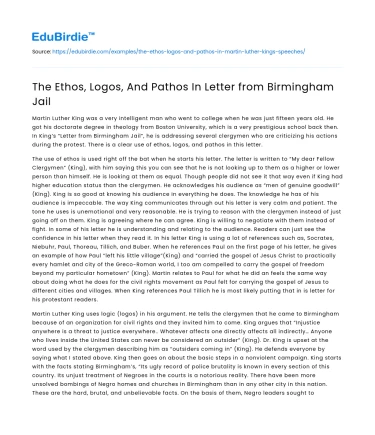Martin Luther King was a very intelligent man who went to college when he was just fifteen years old. He got his doctorate degree in theology from Boston University, which is a very prestigious school back then. In King’s “Letter from Birmingham Jail”, he is addressing several clergymen who are criticizing his actions during the protest. There is a clear use of ethos, logos, and pathos in this letter.
The use of ethos is used right off the bat when he starts his letter. The letter is written to “My dear Fellow Clergymen” (King), with him saying this you can see that he is not looking up to them as a higher or lower person than himself. He is looking at them as equal. Though people did not see it that way even if King had higher education status than the clergymen. He acknowledges his audience as “men of genuine goodwill” (King). King is so good at knowing his audience in everything he does. The knowledge he has of his audience is impeccable. The way King communicates through out his letter is very calm and patient. The tone he uses is unemotional and very reasonable. He is trying to reason with the clergymen instead of just going off on them. King is agreeing where he can agree. King is willing to negotiate with them instead of fight. In some of his letter he is understanding and relating to the audience. Readers can just see the confidence in his letter when they read it. In his letter King is using a lot of references such as, Socrates, Niebuhr, Paul, Thoreau, Tillich, and Buber. When he references Paul on the first page of his letter, he gives an example of how Paul “left his little village”(King) and “carried the gospel of Jesus Christ to practically every hamlet and city of the Greco-Roman world, I too am compelled to carry the gospel of freedom beyond my particular hometown” (King). Martin relates to Paul for what he did an feels the same way about doing what he does for the civil rights movement as Paul felt for carrying the gospel of Jesus to different cities and villages. When King references Paul Tillich he is most likely putting that in is letter for his protestant readers.
Save your time!
We can take care of your essay
- Proper editing and formatting
- Free revision, title page, and bibliography
- Flexible prices and money-back guarantee
Martin Luther King uses logic (logos) in his argument. He tells the clergymen that he came to Birmingham because of an organization for civil rights and they invited him to come. King argues that “Injustice anywhere is a threat to justice everywhere.. Whatever affects one directly affects all indirectly… Anyone who lives inside the United States can never be considered an outsider” (King). Dr. King is upset at the word used by the clergymen describing him as “outsiders coming in” (King). He defends everyone by saying what I stated above. King then goes on about the basic steps in a nonviolent campaign. King starts with the facts stating Birmingham’s, “Its ugly record of police brutality is known in every section of this country. Its unjust treatment of Negroes in the courts is a notorious reality. There have been more unsolved bombings of Negro homes and churches in Birmingham than in any other city in this nation. These are the hard, brutal, and unbelievable facts. On the basis of them, Negro leaders sought to negotiate with the city fathers. But the political leaders consistently refused to engage in good-faith negotiation” (King). This is a huge part of his letter because he gives nothing but the facts about the city. He even states that the colored people of Birmingham try to negotiate with the city fathers but they refuse.
The use of Pathos is used all throughout King’s letter in the emotion of his language. Especially when King talks about his family. In the paragraph that he’s talking about his daughter and son he is faced with some tough questions from his young children. King states, “When she is told that Funtown is closed to colored children, and see the depressing clouds of inferiority begin to form in her little mental sky, and see her begin to distort her little personality by unconsciously developing a bitterness toward white people; when you have to concoct an answer for a five-year-old son asking in agonizing pathos, ‘Daddy, why do white people treat colored people so mean?’” (King). Martin Luther King has to explain to his children why white people are so mean and why they can’t go to fun places in the community such as a park where everyone else gets to go.
The Ethos, Logos, and Pathos that King uses in his letter is remarkable. He knows how to use the tone of his voice, how to appeal to his audience and what facts to use. King closes the letter with a sense of resolution and humbleness.






 Stuck on your essay?
Stuck on your essay?

